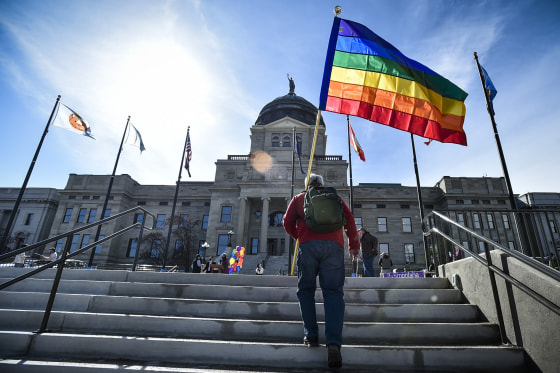Two transgender Montanans filed a lawsuit Friday against the state over a new law that requires trans people who want to change the gender marker on their identifying documents to prove that they've had genital surgery.
The law, signed by Republican Gov. Greg Gianforte in April, states that the sex designation on a birth certificate can only be changed if the Montana Department of Public Health and Human Services "received a certified copy of an order from a court indicating that the sex of an individual born in Montana had been changed by surgical procedure."
Montanans Amelia Marquez, a transgender woman, and John Doe, a transgender man, argue in their lawsuit that the measure violates their constitutional rights to privacy, equal protection of the law and due process, according to an American Civil Liberties Union statement, which is representing the plaintiffs along with the ACLU of Montana and Nixon Peabody LLP.
Marquez, who has lived in Montana all her life, has received hormone therapy and counseling but cannot afford the surgery required by the new law, according to the lawsuit, which was filed in Montana's 13th Judicial District Court and names the state of Montana, Gianforte, the Montana Department of Public Health and Human Services and Adam Meier, the state health department's director, as defendants.
"My inability to obtain a birth certificate that accurately reflects my female gender identity is a painful and stigmatizing reminder of the State of Montana’s refusal to recognize me as a woman," Marquez said in the ACLU statement. "Further, denying me an accurate birth certificate places me at risk of embarrassment or even violence every time I am required to present my birth certificate, because it incorrectly identifies me as male."
Gianforte's and Meier's offices did not return requests for comment.
Nationally, only 25 percent of transgender and gender-nonconforming people reported having undergone some form of transition-related surgery, according to the 2015 U.S. Transgender Survey. As a result, advocates say laws requiring genital surgery make it impossible for most trans people to change their gender markers on birth certificates or driver's licenses.
Doe, the other plaintiff, has received some transition care but doesn't want to have additional surgeries that may be required by the law, according to the lawsuit.
If Doe had to show his current birth certificate, it would force him to out himself, which is "unconscionable," Akilah Lane, a staff attorney for the ACLU of Montana, said in the statement.
"In addition, requiring Mr. Doe to appear in court would result in significant emotional and financial burdens that are absolutely unnecessary," Lane said. "Mr. Doe, Ms. Marquez, and all Montanans who seek to correct the sex designation on their birth certificate should be able to without the undue burden created by this recent and inhumane law."
Montana's law requires an individual to reveal their private medical information in a public court proceeding, and, as a result, "deprives that person of their rights to equality and privacy in violation of the Montana Constitution," the lawsuit states.
Prior to the governor signing the measure, the Montana Department of Public Health and Human Services used regulations it put in place in December 2017 that did not require surgery or court proceedings, according to the ACLU.
But in April, supporters of the surgery requirement said it would prevent people from casually changing their gender marker, the Montana Free Press reported, though advocates have said that doesn't happen.
Republican state Sen. Carl Glimm, who introduced the bill, said on the Senate floor in early March that he thinks birth certificates are "an item of fact," according to Montana Free Press. "When a person is born, you record where they’re born, you record their weight, you record their sex. And that’s important information to document," he said.
Montana is the only state so far this year to pass a law that makes it more difficult for trans people to change their IDs, according to the ACLU. In fact, most states are slowly removing such restrictions and are allowing trans people to change their gender markers through self-attestation, which allows someone to decide which gender marker best represents their gender identity.
Twenty-three states allow self-attestation to change a gender marker on a birth certificate and do not require surgery nor a court order, according to the Movement Advancement Project, a nonprofit LGBTQ think tank. Fourteen states allow an M, F or X, a nonbinary gender marker, on birth certificates.
Laws in the remaining states are a patchwork. Twelve states have policies that are unclear regarding surgical or clinical requirements and may require a court order. Fourteen states, including Montana, require proof of surgery, and one state, Tennessee, does not allow gender marker changes on birth certificates.
Courts have recently decided in favor of trans people in other states that have sued over laws similar to Montana's. In January, a federal court ruled that Alabama's law requiring proof of surgery to change the gender marker on a driver's license was unconstitutional.
In the ACLU statement, John Knight, senior staff attorney with the ACLU LGBTQ & HIV Project, said Montana "has decided to increase government bureaucracy in people’s lives" despite the increasing number of states that are reducing restrictions on changing gender markers.
"Courts and state lawmakers around the country have increasingly said that these barriers to accurate identity documents are unnecessary and serve no purpose for the government," Knight said in the statement. "Transgender and nonbinary people need recognition of who they are and not permission from the government to live their lives."
In late June, the State Department announced that nonbinary, intersex and gender-nonconforming Americans will eventually be able to choose a passport gender marker other than the traditional "male" or "female." In addition, U.S. passport applicants will no longer be required to provide medical documentation if their gender identity does not match the gender marker on their other identifying documents.

